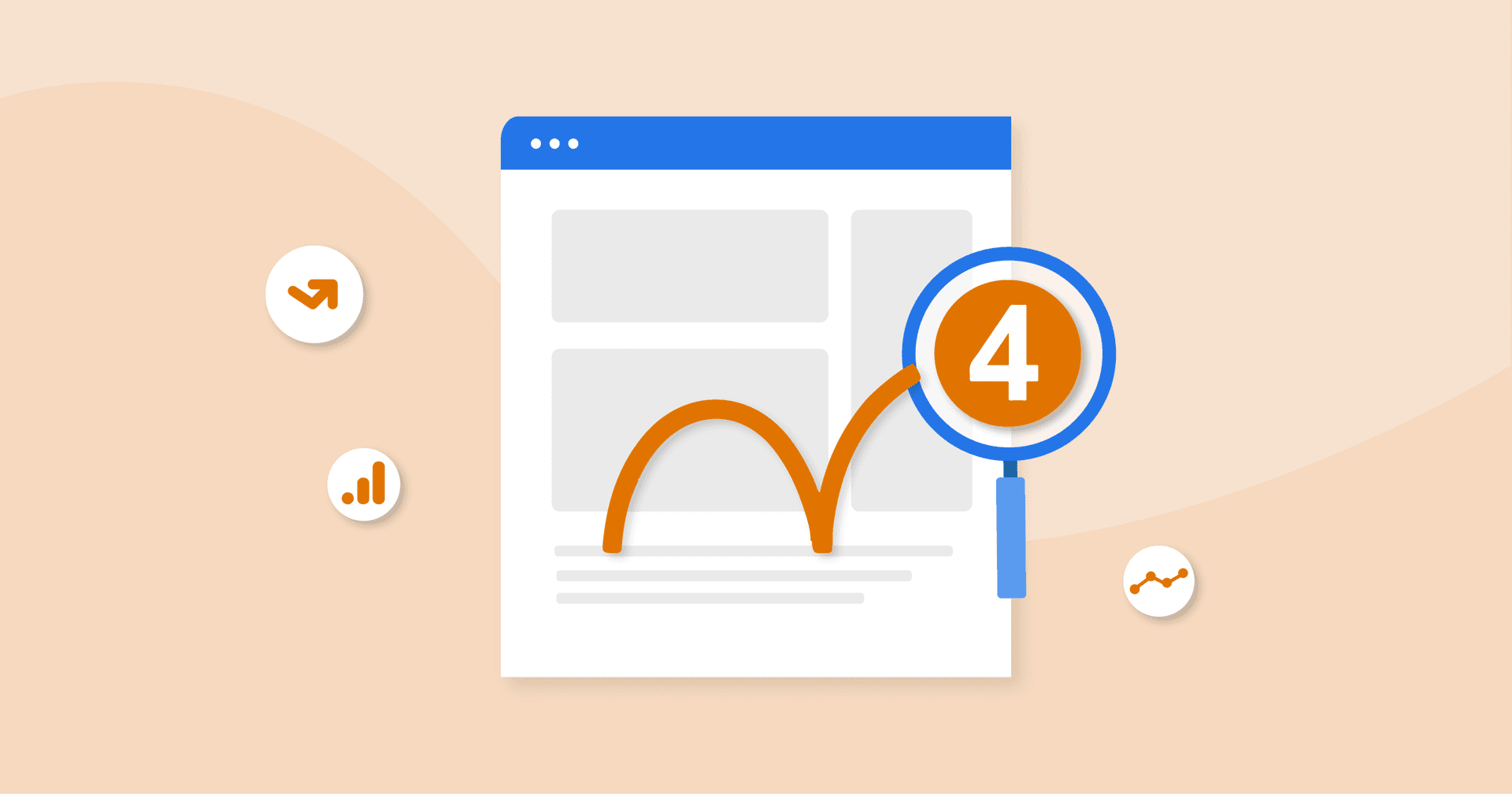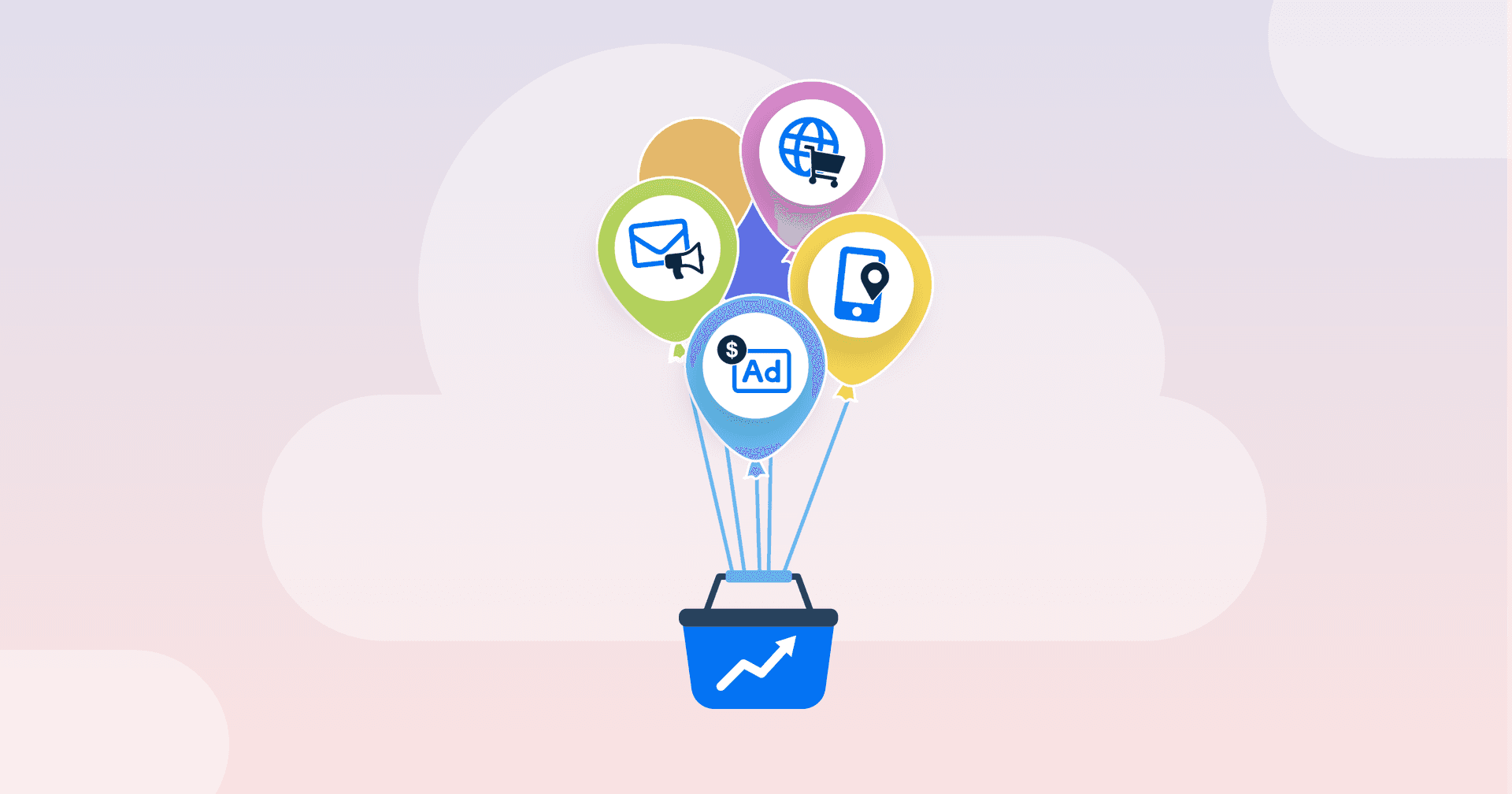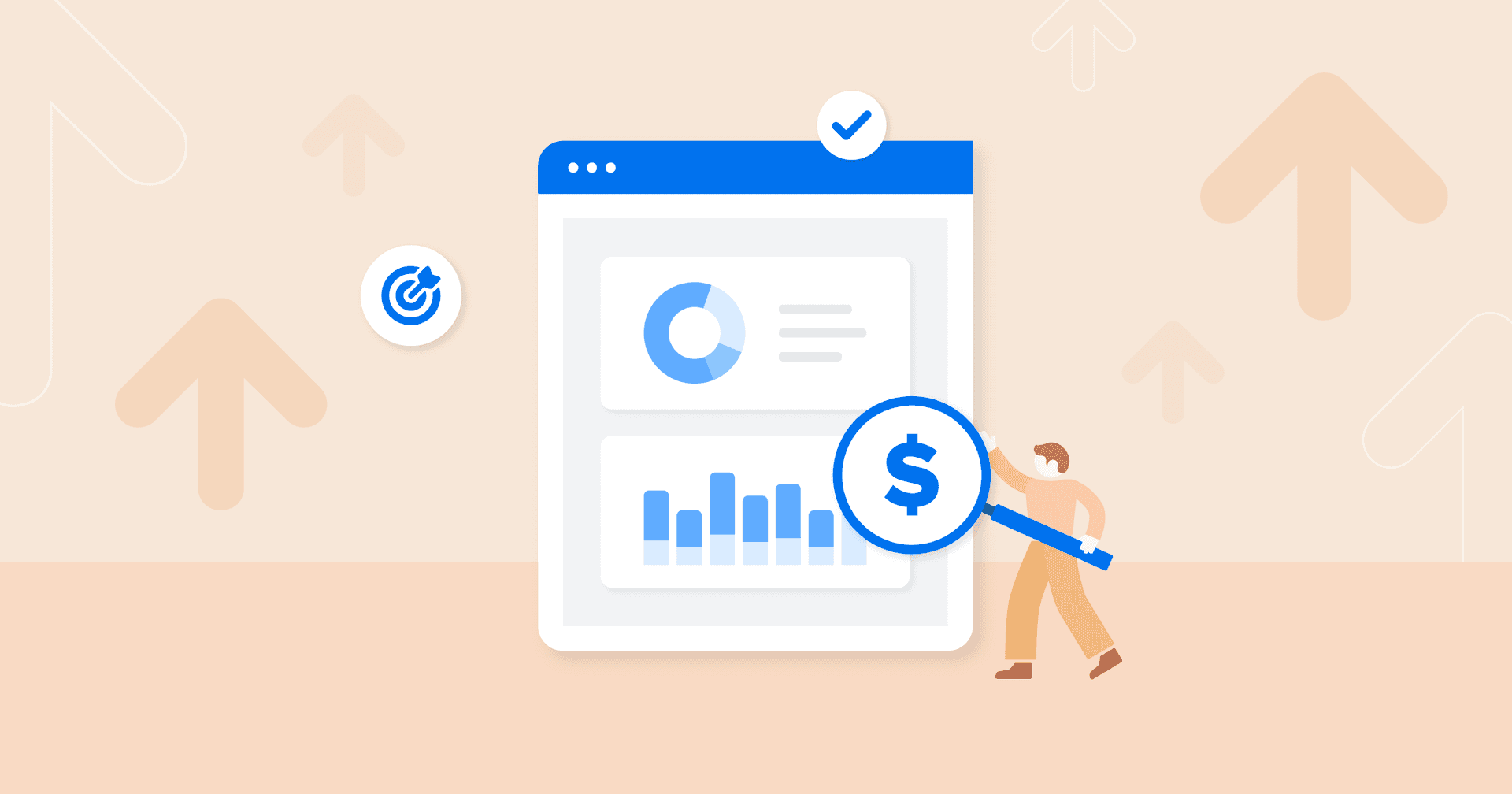“PPC ads are a key part of our clients' digital marketing strategies as they drive measurable impact toward their goals,” says Reed Emerson, Director of Strategy at Avenue Agency. In fact, PPC campaigns are known to be relatively cost-effective and drive immediate results. But with so many PPC metrics to sift through on multiple advertising platforms, it’s easy to get caught up and lose sight of the bigger picture.
We asked PPC experts, agency founders, and marketing directors to identify the critical metrics that every agency should be tracking to maximize their clients’ ROI.
Why PPC Is Still an Important Part of Any Digital Marketing Strategy
Ad campaigns raise brand awareness, boost website traffic, and (most importantly) drive sales. According to Ryan Kelly, CEO of Pear Analytics, PPC campaigns are important to most digital marketing strategies because they do two things:
They help generate much-needed leads in the near term, and
They help uncover new phrases and terms that could be useful in a parallel SEO strategy.
While PPC holds its own as a stand-alone demand gen channel, it is also great for informing your longer-term marketing strategies, namely, SEO. The real-time data of your campaigns helps with SEO research by guiding your team towards the most important keywords and phrases, to then test and find which paid ads are the most effective before the organic traffic even starts trickling in.
PPC’s first objective is to acquire qualified traffic, but as an agency that provides both PPC and SEO, we also use it for testing and research. Before earning organic ranks for a keyword, we try it out using PPC to test how users searching for it interact with a brand and its products.
Matt Beech, Marketing Director at Patch Marketing
If your agency clients are new to digital marketing (or, at the very least, slow to adopt it), PPC advertising helps jumpstart that client’s online presence.
Rebecca Pena, the Marketing Director at Investigator Marketing, has many clients who are trying out PPC ads for the first time, and she’s seen them start generating qualified leads within 24 hours of launching their first PPC campaign. Pena says that PPC ads are “extremely important for clients who have brand-new websites with no ranking keywords.”
PPC ads also help clients quickly gain traction while allowing you to direct traffic to the landing page you want–whether you want to boost a less popular landing page or nudge customers toward a new product, service, or promotion.
We utilize PPC to help give our customers a boost in page placement when their clients are searching for them from print advertising we also generate.
Jared Lauritsen, President at RV Park Map
The quick results of PPC also do wonders for getting reluctant clients to buy into paid search advertising while also giving them a great first impression of its potential for their business. Sometimes, it will be all the proof your clients will need because, after that, they’ll trust that your agency knows what it’s doing and let you do your thing.
Is PPC Advertising Still Effective?
If you’re trying to convince your clients of the effectiveness of PPC campaigns, it’s important to note that they are especially effective at reaching targeted audiences. More so than practically any other marketing channel.
PPC campaigns allow us to target highly specific audiences from prospecting to reconnecting with loyal customers.
Tim Akers, Founder of Akers Digital
PPC ads also have some of the best returns on investment, with an average of 200% ROI for paid advertising.
How’s that for cost-effective?
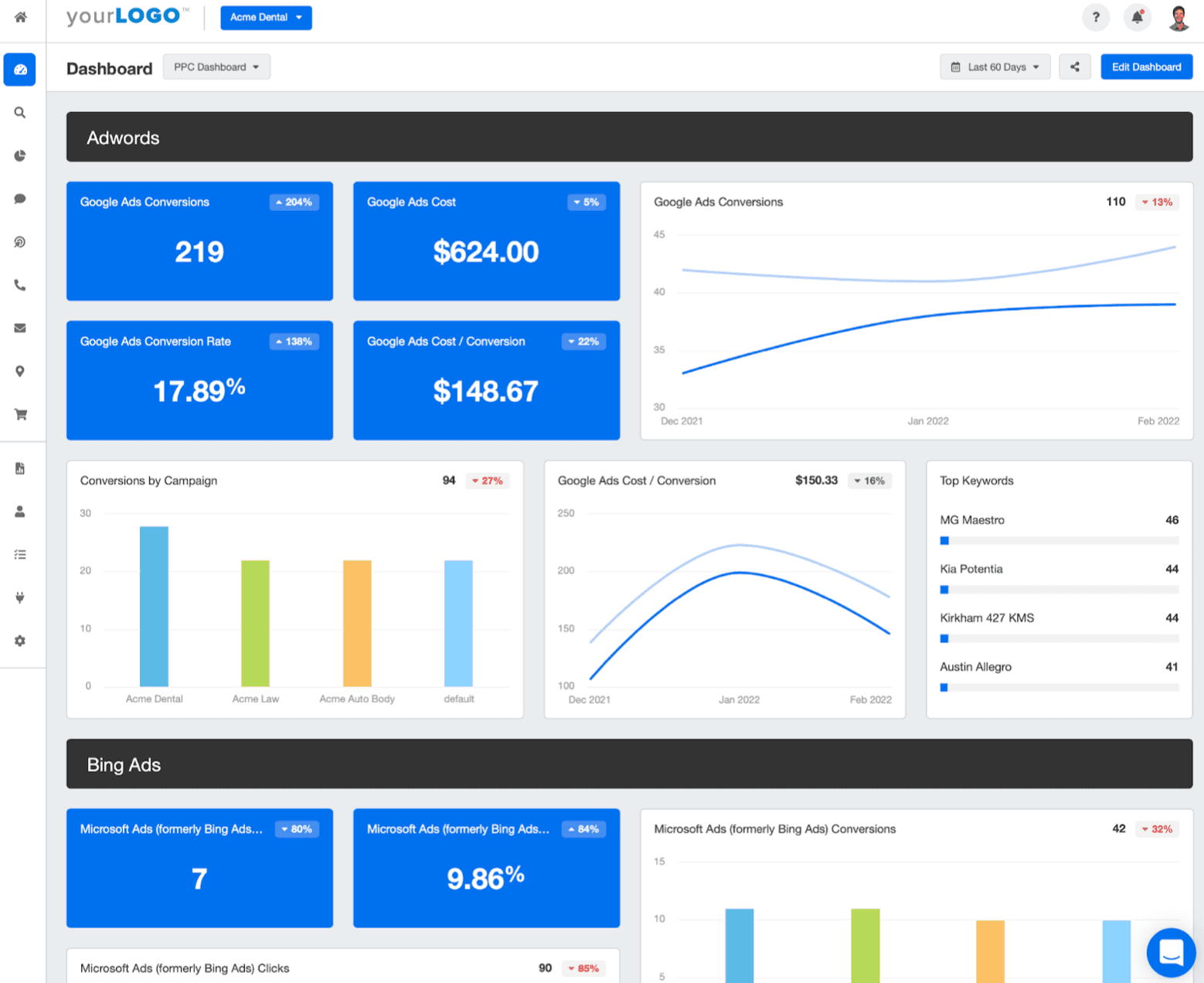
Easily compare your revenue to the cost of your ad campaigns in AgencyAnalytics. Try it free for 14 days!
As one of the most effective lead generators, there are many reasons why PPC should be an integral part of your client’s digital marketing strategies. But one of the biggest advantages of Pay-Per-Click is the ability to respond rapidly.
Whether it's driving brand awareness, increasing sales, or generating more leads, PPC ads allow for real-time control over ad spend, targeting, and creatives to most effectively get in front of our client’s desired audiences.
Reed Emerson, Director of Strategy at Avenue Agency
With PPC, quickly adapt your strategies on the fly to focus on what’s working while avoiding what’s not.
As Akers put it, "PPC campaigns are a vital touchpoint for us to deliver our marketing message."
PPC also allows you to finetune every aspect of your campaigns through A/B Testing. This makes it a great way to put your theories to the test and track them as you go for real-time results.
But to have successful campaigns, you need to track the most important metrics.
Track and analyze your client’s paid advertising metrics in a dedicated dashboard
Try the PPC reporting tool for free for 14 days!What Are the Most Important PPC Metrics?
These metrics are the numbers that help you determine whether your PPC campaigns are successful or not and which should be queued up for a thorough PPC optimization review. And with many platforms to choose from when running ad campaigns, you end up with hundreds of different metrics to choose from to measure success.
Given the plethora of paid channels and ad types, agencies really need to strategize and plan what they're going to do, how it will be set up and how results will be measured, and how to determine when a pivot or change in the campaign strategy will be triggered.
Ryan Kelly, CEO of Pear Analytics
But not all PPC metrics are created equal. Some may look good at a glance, while others will clearly illustrate the growth that your agency is delivering. That’s why it’s important to differentiate between the core marketing metrics that a client needs to see versus the vanity metrics they may want to see.
When deciding which metrics to include in your PPC report template, consider these important factors:
Which metrics highlight the growth driven by your agency
Which metrics are meaningful and actionable
Which metrics showcase progress towards your clients’ intended business goal
Agencies need to define the PPC metrics they’re tracking for clients and why because it will affect the quality of the data that you’re using as the foundation of your client’s marketing strategies. And how you create your PPC report for them.
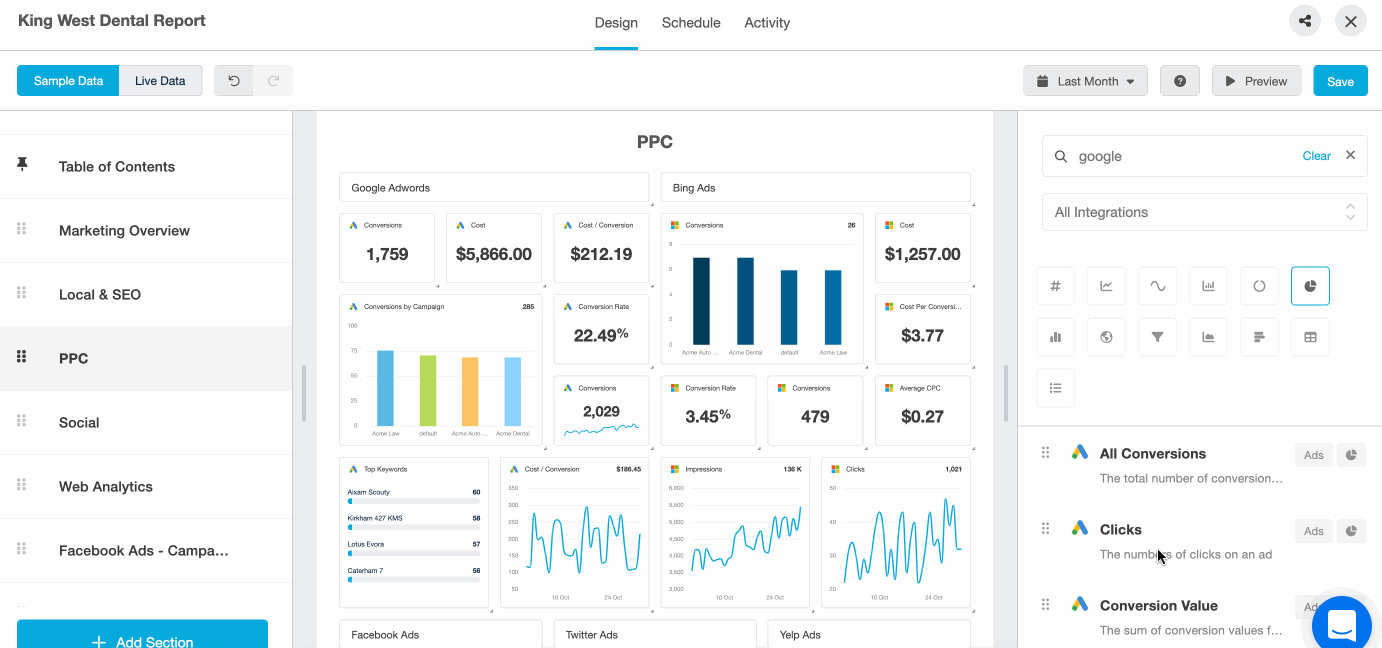
Use this exact template free for 14 days with AgencyAnalytics.
How To Choose the Right KPIs for Pay-per-Click
Before starting a PPC campaign, you need to align with the client on the goals and what the end results of a successful campaign look like before any campaign is launched.
These will vary from client to client and from campaign to campaign based on various factors, including the client’s goals, business type, buyer stage, and conversion targets.
PPC Metrics for Your Clients’ Goals and Business Type
The metrics you focus on will often depend upon your client’s end goals and where the customer is in the customer journey.
“We first go through a rigorous onboarding process, and we really want to get down to what a lead (or sale) is worth to the client,” says Ryan Kelly, CEO of Pear Analytics. For instance, their B2B clients focus on the cost per engagement, cost per lead, and cost per acquisition.
For eCommerce clients, on the other hand, their agency looks at cost per engagement and ROAS. Video campaigns, on the other hand, look at the cost per view.
The important thing is to be able to easily compare those metrics to other channels, such as organic search or social media. Having a global view of PPC metrics, alongside other advertising channels, helps agencies determine the cost-effectiveness of their campaigns.
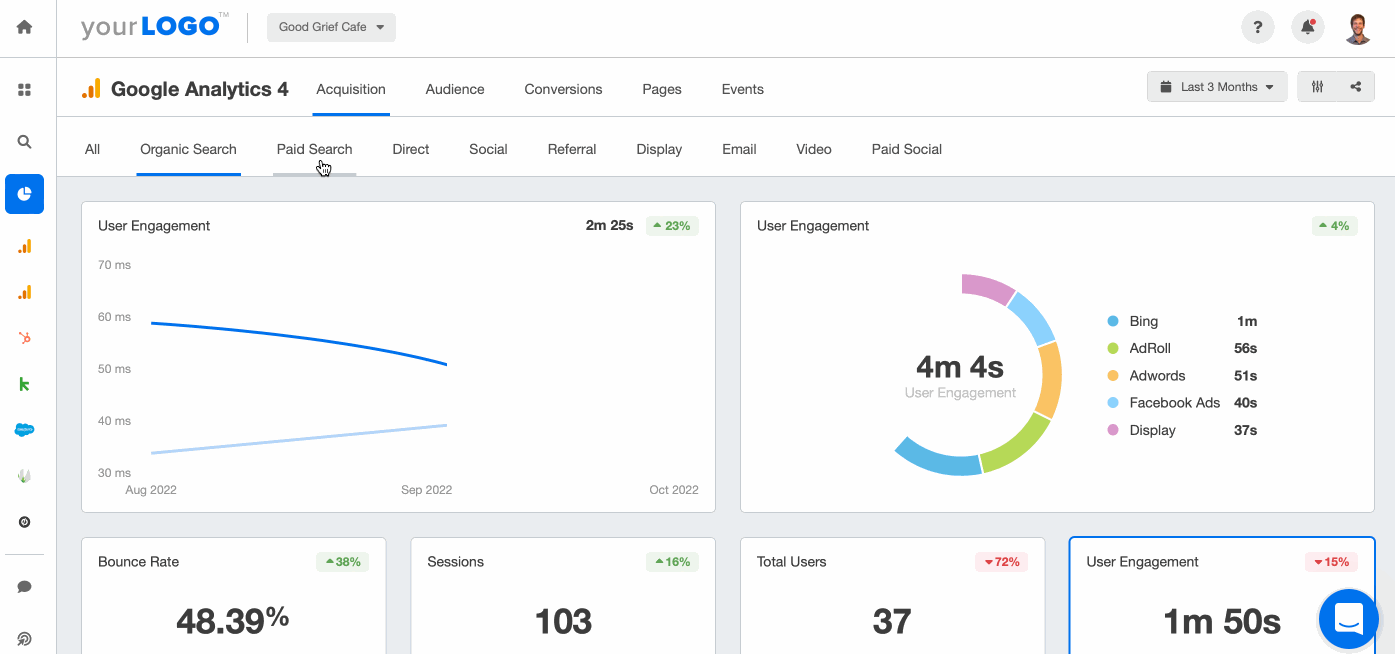
Use a Google Analytics dashboard to keep track of all your clients’ key metrics under one roof. Start your free 14-day AgencyAnalytics trial to streamline your PPC reporting today.
With GA4, we can get a better sense of the cost-per-engagement metric, which is a new metric for us in 2022.
Ryan Kelly, CEO of Pear Analytics
Metrics for Different Stages of the Buyer’s Journey
Understanding the buyer’s journey–and how your agency helps support that–is also an important factor in determining the critical metrics.
For example, if your client is primarily focused on awareness, then impressions and clicks will be important metrics to focus on. However, if their goal is to drive sales through retargeting, then the focus will typically narrow down to conversions, revenue, and ROAS.
If a customer is just learning about the brand, we will use CPM (cost per thousand impressions) or engagement KPIs. If they are lower funnel, we will use a ROAS (return on ad spend) or Revenue goal.
Tim Akers, Founder of Akers Digital
Depending on your clients’ targets, you can adjust your PPC campaign strategy and the metrics that go along with it.
Metrics for Conversion Goals
Analyzing your clients’ PPC metrics shows you how much a lead or conversion is worth to your clients. However, it’s important to consider the difference between B2B and B2C conversion metrics when coming up with your clients’ KPIs–and set the right parameters to ensure the reliability and usefulness of your data.
For example, getting the right data can be as easy as only counting the qualified leads in your Cost per Lead (CPL) metric. Doing this will give you a more accurate picture of the actual cost of those leads because it only focuses on the qualified leads and ignores the low-quality, spammy leads that don’t go anywhere, which can skew your results.
Stop including leads in your reports that are not ‘real’ leads. These would be things like phone calls that are less than 30 seconds or form fills that are spam. This ends up masking the real CPL.
Ryan Kelly, CEO at Pear Analytics
By only counting qualified leads, you prevent your cost-per-lead calculation from being based on inaccurate data that makes it seem like the CPL is a lot lower than it actually is.
Agency Tip: Rather than using a catch-all lead conversion action, create unique conversions for different types of leads, and focus your reporting and optimization on the types of leads that drive the most customers. Add the top conversions into conversion action sets to train the PPC algorithm to go after more of these types of customers.
A Note for Ad Spend and Budgets
Sometimes, there isn’t any way of knowing how successful a strategy will be until you try it out in real life. But at the same time, agencies need to keep in mind how quickly marketing costs can add up, especially when you’re spending your clients’ money.
The more you spend, the more your clients will want results– it’s human nature, after all– so you need to know when to cut your losses and pivot your strategy because you don’t want to get lost down a rabbit hole, either.
Regardless of whether your results are successful or not, you still need to be able to pull something from it and adapt.
As Ryan Kelly, CEO of Pear Analytics, put it, “No client likes spend overruns, and they certainly don’t like spending money without learning anything.”
So it’s imperative that no matter what happens, you can tell your clients what you learned from the last PPC campaign and also what steps you’re going to take to make the next one even better.
But first, you have to ask yourself a question:
What Are Your End-goals?
This is where you and your client figure out what the PPC campaign will be for. It could be any number of things, including:
Drive website traffic
Increase the number of leads
Get more incoming calls
Increase conversions
Build brand awareness
Whatever your end goals, it should align with your client’s business needs, and you should make sure the Pay-Per-Click goals are SMART.
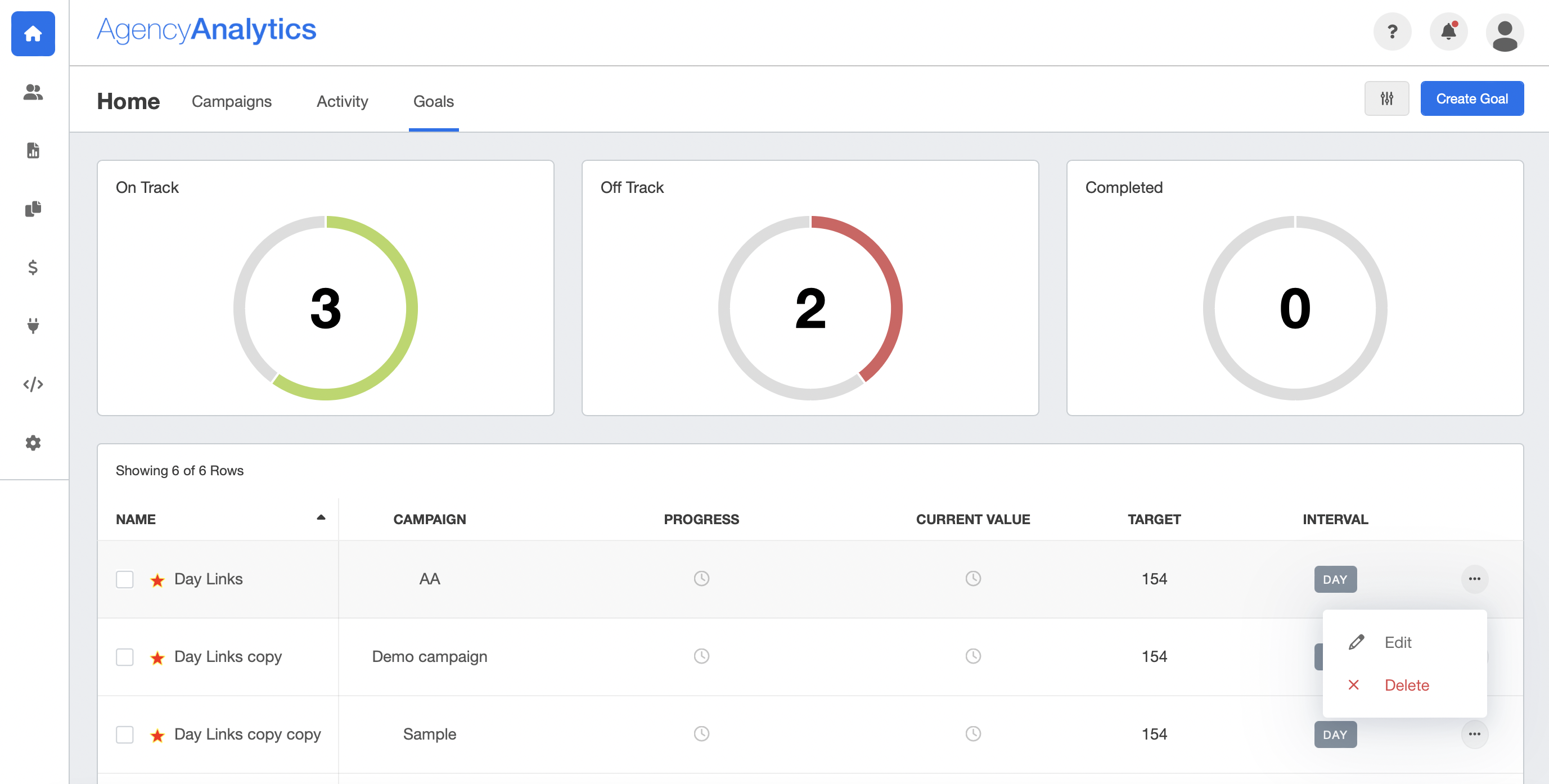
Incorporate goal-tracking into your PPC campaign processes. This feature is built into AgencyAnalytics to make optimization easy. Try it free for 14 days!
What Are Some Good KPIs for PPC?
Your KPIs should be tied to your business goals and should be facing the future and always looking to improve, whereas your metrics give you a snapshot of how your PPC campaigns are doing at a specific point in time.
15 PPC Performance Metrics You Should Be Tracking
Here’s a list of some of the most important PPC metrics your agency should be tracking, starting from the top of the marketing funnel and going all the way down to the bottom.
Top-of-Funnel PPC Metrics
Important top-of-funnel PPC metrics to monitor and track include:
Web traffic or Clicks
Cost per lead (CPL)
Number of new leads
Number of calls
Reach
Bounce rate
Stuck in the Middle With You: Mid-funnel PPC Metrics
The middle of the funnel often gets overlooked as marketers are either too focused on the top or bottom of the funnel. But there’s a big risk in that because the mid-funnel connects the top and bottom parts of the funnel.
Here are a few key mid-funnel metrics to look out for:
CTR on remarketing campaigns
Number of new sign-ups or subscribers
Number of form fills
Sometimes, you might notice your campaigns getting a lot of attention and interest, but you aren’t getting the conversions you’d expect. That could be a sign that your client’s PPC campaign is failing in critical mid-funnel funnel activities like keeping the interest alive or building trust.
Started from the Bottom: These Metrics Measure Success
The bottom of the funnel is where you find the performance-based metrics that show you the overall success of your PPC campaign.
These metrics include:
Total conversions
Total revenue
Return on ad spend (ROAS)
Conversion rate (aka close rate)
Awareness and Traffic-focused KPIs for Pay-per-Click
These awareness and traffic-focused KPIs will give you a good idea of how effective your top of funnel PPC ads are doing.
KPI | Description |
|---|---|
KPI Website Traffic (Clicks) | Description This shows how many people are visiting your client’s website, and you can track how much of it is coming from your PPC ads with UTM parameters |
KPI Impressions | Description This shows how many times your PPC ad was displayed |
KPI Impression Share | Description There are a few ways this is measured, but it indicates how often your client’s add appears versus the competition. |
Keyword and Ad-based PPC Metrics
Keyword-focused KPIs will help you get a better understanding of the effectiveness of your client’s keyword strategy.
KPI | Description |
|---|---|
KPI | Description A good CTR indicates that your ad is grabbing attention, so the more clicks the better. It gives you an idea of how well your keywords and PPC ads are doing |
KPI Average Position | Description The goal is to get a better ad position, so this PPC metric shows you how well your client’s paid ads rank against the competition for similar keywords |
KPI | Description Of course, the goal here is to get a higher quality score. Quality Score is how Google measures how well your client’s ads compare to the competition, measured on a scale from 1-10 |
Results-based Metrics
These are the metrics that will tell you whether your PPC ad campaign was successful or not.
KPI | Description |
|---|---|
KPI Total Conversions | Description This is the number of all the completions you’re tracking |
KPI Total Revenue | Description This is how much money your ads are bringing to your client’s business |
KPI Return on ad spend (ROAS) | Description ROAS measures how much gross revenue is generated by your ad spend |
KPI Cost per action (CPA) | Description This metric shows how much it costs for a conversion or conversion action, which can include leads and sales |
KPI Conversion rate | Description Conversion rate is the percentage of people who convert after clicking on your PPC ad. If your clients are getting a low conversion rate, it's worth seeing why that's the case to move the needle in the right direction |
KPI Cost per lead (CPL) | Description This KPI is very important when budgeting because it shows how much money your clients should expect to spend to gain new leads |
Engagement-based Metrics
Audience engagement metrics measure how much the audience interacts with your PPC ads.
KPI | Description |
|---|---|
KPI Bounce rate | Description Bounce rate measures how engaging a client’s PPC ad and landing page is. It measures the percentage of people who view your website and leave without taking any action.
In GA4 reports, the bounce rate is the inverse of the engagement rate. |
KPI Cost per engagement (CPE) | Description CPE is usually cheaper than cost per click because it counts all engagements instead of clicks only, making it ideal for tight budgets |
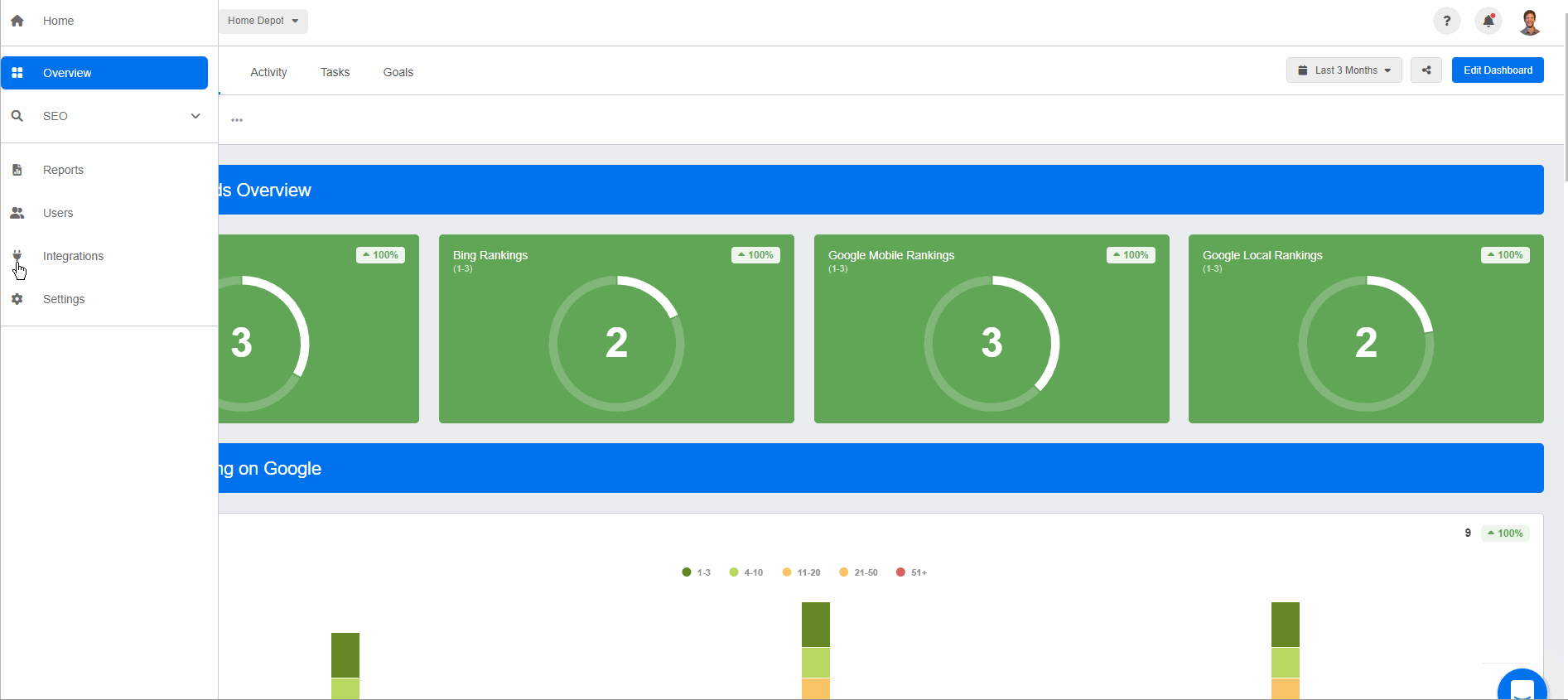
With all these metrics to track, connect all your clients’ PPC metrics in one place–from LinkedIn Ads, AdRoll, to Google Ads, Facebook Ads, and more. Try AgencyAnalytics free for 14 days.
Advice on PPC Metrics From the Pros
We asked our agency clients what they would say if they could give someone ONE piece of advice on PPC metrics. These answers come from years of experience, and this is what they had to say:
1. Know How Your Metrics Are Created
Each platform will use slightly different metrics or calculate them in different ways. For example, a Purchase in Meta is different than a Conversion in Google Ads. Which is different than All Conversions (Google Ads) and Web Purchases (Meta).
Tim Akers, founder at Akers Digital
2. Communicate Clearly Up Front
Make sure each part of their overall funnel is a function of revenue. PPC only works if they can close the deal, so if they have a 3% close rate, make sure you factor that into their results!
Jared Lauritsen, President at RV Park Map
3. Focus on What Matters
The cost per sale matters more than the cost per click. Focus on cost per action. Once you know your target cost per sale, you'll know which keywords are achieving it and which aren't.
Matt Beech, Marketing Director at Patch Marketing
Or, to be more to the point:
Prove the ROI as best as possible.
Rick Warda, President at Suite Edge
4. Report on What Your Clients Care About
Find out what the client cares about the most and show them that information. Clients don't need to be given data they don't understand, EVEN if it makes you look good. Give them only what they want.
Rebecca, marketing director at Investigator Marketing
Streamline Your PPC Metrics Reporting
Reporting on your campaigns is one of the most important parts of the process because this is where you get the chance to show clients their PPC ROI and stay competitive. Use a digital marketing report template to make tracking and analyzing your client’s paid advertising metrics as easy and effortless as possible.
Your clients will also appreciate the PPC reporting tool and digital marketing reporting tool that clean up the data and make it easy to understand with visualizations that bring the data to life in beautiful graphs and charts.
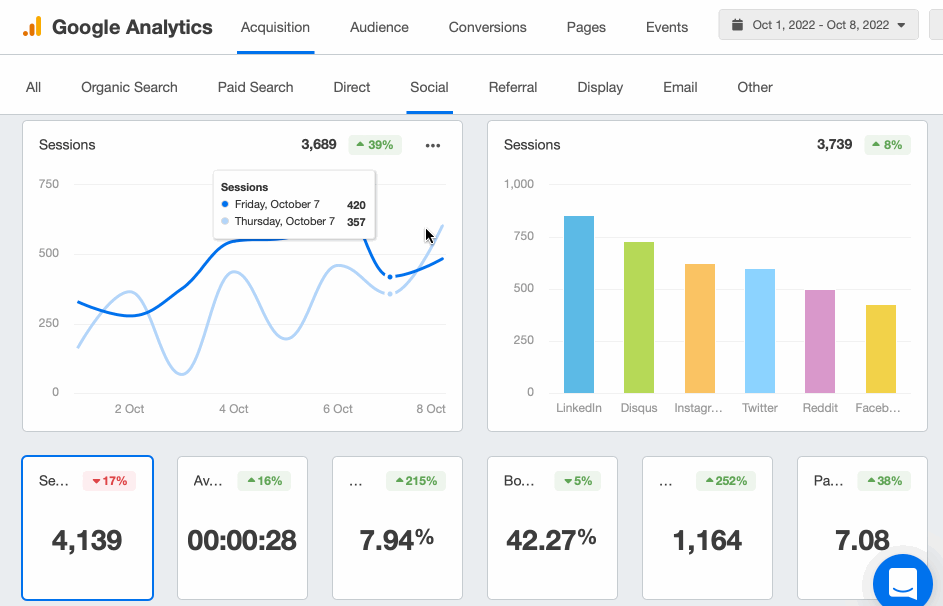
With the help of our PPC dashboards, show off your most important metrics in real-time and easily analyze and tweak your paid advertising campaigns while consolidating all of your data conveniently in one platform.
Streamline Your Agency’s Client Reporting
Start Your Free Trial TodayBring clarity to your data, showcase the metrics clients care about in a digital marketing report, and keep showing off the value your agency brings to the table. Starting with a marketing report template makes it easy to turn data into narratives that resonate.

Written by
Michael is a Vancouver-based writer with over a decades’ experience in digital marketing. He specializes in distilling complex topics into relatable and engaging content.
Read more posts by Michael Okada ›Get Started for Free


